- Home
- Rabindranath Tagore
The Boat-wreck
The Boat-wreck Read online
The Boat-wreck
RABINDRANATH TAGORE
Translated from the Bengali
by Arunava Sinha
CONTENTS
1
2
3
4
5
6
7
8
9
10
11
12
13
14
15
16
17
18
19
20
21
22
23
24
25
26
27
28
29
30
31
32
33
34
35
36
37
38
39
40
41
42
43
44
45
46
47
48
49
50
51
52
53
54
55
56
57
58
59
60
61
62
P.S. Insights Interviews & More...
No Generalized Answer is Possible: Tagore’s Introduction to His Novel
A New Kind of Realistic Novel: An Analysis of Noukadoobi, 1938
Love and Marriage in Noukadoobi
Milan, Ghunghat, Noukadoobi: The Novel and Its Film Adaptations
Notes
About the Book
About the Author
Copyright
1
No one doubted that Ramesh would pass his law examination this time. The goddess of learning at the university had consistently showered petals from her golden lotus to ensure medals for Ramesh – he had not missed a single scholarship.
Now that the examinations were over, it was time for him to go home. But he displayed no enthusiasm to pack his trunk. His father had written, asking him to come home quickly. Ramesh had replied that he would return as soon as the results were declared.
Annada-babu’s son Jogendra was Ramesh’s classmate. He lived next door. Annada-babu was a Brahmo. His daughter Hemnalini had taken her F.A. examination this year. Ramesh often visited Annada-babu’s house for a cup of tea, but not just for a cup of tea.
Hemnalini used to study on the roof, where she dried her hair after a bath. At exactly the same hour, Ramesh used to settle down with his books on the deserted terrace of his own house. The place was admittedly conducive to academic pursuits, but on further thought, the impediments were obvious.
No proposal for marriage had been made from either side. There was a specific reason for nothing forthcoming from Hemnalini’s father. A certain young man was in England and soon to become a barrister, and Annada-babu had set his sights on him.
An animated argument had broken out over tea the other day. The young man, Akshay, had not made much headway at college, but that made his thirst for tea and other things no less than those of his compatriots with degrees. Accordingly, he was to be seen sometimes at Hemnalini’s tea salons. His contention was that male intelligence was like a heavy blade – even if it wasn’t sharpened, its weight alone could do the job; but the female intellect was like a pencil-sharpening knife – no matter how well-honed it was, it could accomplish nothing significant. And so on. Hemnalini was prepared to ignore Akshay’s garrulousness with silence, but her brother Jogendra appended his own argument in favour of viewing the woman’s brains as inferior. Now Ramesh could no longer be restrained. Agitated he began singing praises to womanhood.
Flush with the exuberance of his deference to women, Ramesh had consumed a couple of cups more of tea than he was wont to when a bearer handed him a letter. His name was visible on it, written in his father’s hand. Reading the letter, Ramesh broke off in the middle of his declamation and rose to his feet hurriedly.
‘What’s the matter?’ asked everyone.
‘My father’s here,’ said Ramesh.
Hemnalini told Jogendra, ‘Why don’t you request Ramesh-babu’s father to join us, Dada? He can have his tea with us.’
‘Not today, I’d better go,’ Ramesh interjected quickly.
Secretly pleased, Akshay said, ‘He might object to having his tea here.’
Ramesh’s father Brajamohan told him, ‘You have to come back home by the morning train.’
‘Anything urgent?’ asked Ramesh tentatively.
‘Not especially,’ answered Brajamohan.
Ramesh kept looking at his father with the hope of learning the reason for such haste, but the latter felt it unnecessary to assuage his son’s curiosity.
When Brajamohan-babu went out in the evening to meet his friends who lived in Calcutta, Ramesh sat down to write him a letter. ‘Respected father’ was as far as he could get, he made no progress thereafter. But in his head, he said, ‘It would not be right to hide from my father the fact that I am bound by an unspoken truth to Hemnalini.’ He wrote several letters, using different words – but tore up all of them.
Brajamohan sank into comfortable sleep after dinner. Climbing up to the roof, Ramesh paced up and down like a night farer, his gaze fixed on his neighbour’s house.
At nine o’clock, Akshay left Annada-babu’s residence; at nine-thirty, all the doors facing the road were shut; at ten, the lights went out in Annada-babu’s sitting room; and from ten-thirty onwards, deep slumber reigned over the house.
Ramesh had no choice but to leave at dawn. Brajamohan-babu’s watchful eye gave him no opportunity to miss his train.
2
When Ramesh reached home, he discovered that a bride and a wedding date had been finalized for him. At a time when Brajamohan had not been well-off, his childhood friend Ishan, an advocate, had helped him improve his prospects. Ishan died young, and it emerged that he had no savings, only debt. His widow found herself and her young daughter sinking into poverty. This daughter was now of marriageable age, and it was with her that Brajamohan had arranged Ramesh’s marriage. Some of Ramesh’s well-wishers had objected on the grounds that she was not very pretty. Brajamohan had told them, ‘I don’t understand these things very well – a human being is not a mere flower or butterfly, appearance is not the most important thing. If the girl turns out to be as chaste and faithful as her mother, Ramesh should consider it his good fortune.’
Ramesh’s face fell on hearing the news. He wandered about despondently. None of the methods that occurred to him to runaway seemed feasible. Eventually shedding his hesitation with great effort, he told his father, ‘This marriage is impossible, I have committed myself elsewhere.’
Brajamohan was surprised, but asked his son plainly, ‘Indeed! Are you engaged?’
‘No, not exactly, but—’
‘Has everything been finalized with the girl’s family?’
‘Not what you’d call finalized—’
‘It has not, then? In that case, since you have been silent all this while, all you have to do is to continue being silent.’
After a pause, Ramesh said, ‘It would be wrong of me to accept another woman as my wife.’
‘Not doing so might prove a greater wrongdoing.’
Ramesh could argue no more. He began to pray for divine intervention to save him.
According to the almanac, an inauspicious period of one year was supposed to follow the wedding date, when no ceremonies were allowed. Ramesh hoped that if he could somehow prevent the wedding from taking place on the appointed date, he would gain a year’s respite.
To reach the bride’s home, they would have to take a boat ride. It was not a short distance and involved a passage through two or three narrow as well as wide rivers – the journey would take at least three or four days. Making sufficient allowance for unforeseen circumstances, Brajamohan set off on an auspicious day a week in advance.
With a favourable wind all the way, it took less than three full days to reach Shimulghata. The wedding was four days away.
Brajamohan had, in fact, wanted to arrive a few days early. His son’s future mother-in-law lived like a pauper. Brajamohan had long harboured the wish to have her shift to his own village and to ensure a comfortable life for her, thus paying back his debt to his friend. But he had not considered it proper to make this proposal in the absence of any kinship. Now he could use the occasion of the wedding to persuade her. She had only one daughter in the whole wide world – she could not refuse the opportunity to live nearby and play the role of a mother to her motherless son-in-law. ‘Let people say what they will,’ she declared. ‘I belong wherever my daughter and son-in-law choose to live.’
Having arrived a few days before the wedding, Brajamohan busied himself with arrangements to resettle his son’s mother-in-law. He wanted everyone to travel back together after the wedding. He had brought along some of his female relatives for this purpose.
Ramesh did not repeat the sacred words correctly during the wedding, shut his eyes during the shubhodrishti ritual where the bride and the groom looked at each other for the first time, suffered the traditional good-natured nuisances of the evening after the ceremonies in submissive silence, spent the first night in bed with his back to his bride, and left the room at dawn.
After the wedding the women left on one boat, the old people on another, and the groom and the rest on a third. On another boat, a group of musicians struck up the opening notes of different ragas without caring for the appropriate hour at which they were traditionally sung.
It was unbearably hot all day. The sky was cloudless and everything seemed shrouded in a pallid hue. The trees on the banks stood grey, their leaves still. The boatmen pulling on the oars were soaked with perspiration. Before the darkness intensified in the evening, they said, ‘Let’s moor the boats for the night. We won’t be able to stop after this for a long time.’ But Brajamohan-babu did not want to slow down. ‘We cannot stop here,’ he said. ‘There will be moonlight in the first half of the night, we can get to Baluhata before we stop. There’s extra money in it for all of you.’
The boats went on. An empty expanse of lowland stretched out on one side, while the bank was high, though broken in parts, on the other. The moon rose through the haze, but it was as blurred as a drunkard’s vision.
Suddenly, although there were neither clouds in the sky nor any other sign of doom, a roar was heard. Looking at the horizon behind them, they discovered a gigantic but invisible force sweeping up branches and twigs, leaving a column of dust in its path as it rushed towards them at breakneck speed. As cries of alarm rose in the air, no one could say with certainty what happened the very next moment. The tornado destroyed everything that stood in its way, leaving not even a single sign pointing to the fate of the boats under its onslaught.
3
The mist had lifted. Unsullied moonlight covered the sandy bank of the river stretching into the distance like the white garb of a widow. There were no boats on the river, no waves – peace reigned over the water in silence, like the detached calm of death after the suffering wrought by a disease.
When Ramesh recovered his consciousness, he found himself lying on the sand. It took him some time to recollect what had happened – after which the events crowded his mind like a nightmare. He rose to his feet to discover the fate of his father and other relatives. But not a soul was to be seen. He proceeded to walk along the sandy riverbank in search of the others.
This white island situated between two arms of the Padma lay on its back like an unclothed infant. Having walked along the edge of one of the branches, Ramesh had just turned towards the other one when he noticed a red sari. Running up to it, he came upon the new bride in her red wedding sari, seemingly lifeless.
Ramesh knew the techniques of resuscitation. He extended her arms upwards and then pressed them down on her stomach, repeating this movement continuously. Gradually, the bride began to breathe, and then eventually opened her eyes.
An exhausted Ramesh sat down for some time in silence. He did not appear to have the energy even to ask her any questions.
The young woman had not regained her consciousness completely. She opened her eyes only to close them the very next moment. Examining her, Ramesh ascertained that there were no further impediments to her breathing. There on that desolate borderline between water and land, between life and death, Ramesh gazed at the young woman’s face for a long time in the pale moonlight.
No one could claim that Sushila was not beautiful. Her tender face with lowered lashes may have appeared small – but still, under this enormous sky and bright moonlight, her beauty and her youth glowed as the only things worth anyone’s attention.
Ramesh mused, ‘It was just as well that I did not set eyes on her during the crowded confusion of the wedding. I would never have seen her this way anywhere else. By reviving her, I have made her mine in a way that no wedding vows could have accomplished. The rituals would have made her mine by natural right, but now I accept her as a gift from a favourable god.’
Regaining her consciousness, the bride sat up, adjusted her clothes and drew the end of her sari over her head like a cowl. ‘Do you know where everyone else on your boat is?’ Ramesh asked her.
She shook her head in silence. ‘Can you wait here for a while?’ Ramesh enquired. ‘I shall go looking for the others.’
The young woman did not answer, but her body seemed to shrink back, imploring him not to leave her side. Ramesh understood. Rising to his feet, he looked around – there was no sign of anyone across the white sand. He called out to his family at the top of his voice, but no one answered.
Giving up his futile efforts, Ramesh sat down again and discovered his wife trying to suppress her sobs with her hands, while her breast heaved. Instead of attempting to console her with words, Ramesh sat close to her, gently stroking her back and her head. She could not contain her tears any more – they began to flow in a wordless torrent. Ramesh began to weep too.
The moon had set by the time their exhausted hearts stopped crying. This desolate part of the earth appeared strangely dreamlike in the darkness. The indistinct whiteness of the sand was a pallid world of ghosts. In the faint light of the stars the river gleamed in places like the lustrous black skin of a serpent.
Taking the tiny hands of the young woman, which were frozen with fear, in his own, Ramesh drew her to himself slowly. The petrified girl did not resist. She was desperate to be close to another human being. Finding shelter against Ramesh’s chest, vibrant with his breath, gave her comfort. This was no time for shyness. She made room for herself in Ramesh’s arms with great eagerness.
As the evening star was about to set at dawn and the sky over the blue line of the river to the east grew pale and then red, it was revealed that Ramesh had lain down on the sand, overcome with sleep, while his newly-wed bride was also fast asleep with her head on his arm. When the soft morning sunlight finally touched their eyes, both of them were startled into wakefulness. They looked around in astonishment for a few minutes before it dawned on them suddenly that they were not at home, that they had been cast adrift.
4
In the morning, the river was studded with the white sails of fishing boats. Hailing one of them, Ramesh hired a large pinnace with the help of the fishermen and, having engaged the police to enquire after his missing relatives, set off home with his bride.
As soon as the boat arrived at Ramesh’s village, he was informed that the police had recovered the bodies of his father, mother-in-law and several relatives and friends. There was no more hope of any s
urvivors other than a few of the boatmen.
Ramesh’s aged grandmother began to cry loudly on seeing Ramesh return with his wife. There was weeping in the homes of the neighbours who had accompanied the groom to the wedding. No conch shells were blown, no ululation was heard, no one welcomed the bride, no one even spared a glance for her.
Ramesh had decided to go away with his wife after the last rites for all their relatives had been completed, but he found it impossible to leave till the family estate had been disposed of. The grieving women of the family had appealed to him to be allowed to make a permanent pilgrimage to Varanasi – he would have to respond to their requests.
When he did get some respite from his responsibilities, Ramesh did not ignore the business of love. Although his wife was not as young as it had been said she was – the village women condemned her for being too old – this young man with a BA degree had not come across instructions on love in any of his textbooks. He had always considered love both impossible and unreasonable in his own life. Still, even though he had not read of love, he had secretly felt the exquisite emotion and surrendered to the young woman. He had seen the luminous goddess of his home in her. And so his wife had bloomed before his inner eye – a young wife, a youthful lover, and a mature mother – all at once. Just as the artist or the poet imagines their creation in a perfectly completed form, nurturing it in their hearts with a love no one else can see, Ramesh had established his future lover and goddess in all her glory in his soul in the form of his ordinary girl.
5
Nearly three months passed this way. All the issues relating to the family were close to being resolved. The older women prepared to move to temple towns. One or two companions for the bride presented themselves from neighbouring houses, keen on making her acquaintance.
The two of them had now begun spending their evenings on the deserted roof, sitting on a mat beneath the open sky. Ramesh would cover her eyes from the back without warning, drawing her head to his chest. When his wife fell asleep without her dinner even before the night had deepened, he prodded her into wakefulness, earning her ire and reproach.

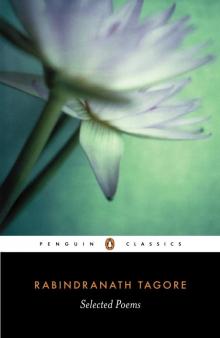 Selected Poems
Selected Poems The Lover of God
The Lover of God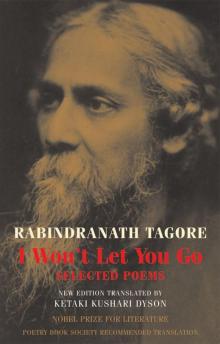 I Won't Let You Go: Selected Poems
I Won't Let You Go: Selected Poems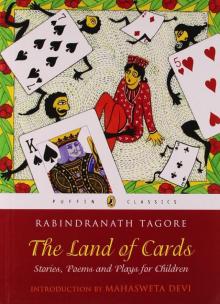 The Land of Cards: Stories, Poems, and Plays for Children
The Land of Cards: Stories, Poems, and Plays for Children The Tagore Omnibus, Volume One
The Tagore Omnibus, Volume One The Boat-wreck
The Boat-wreck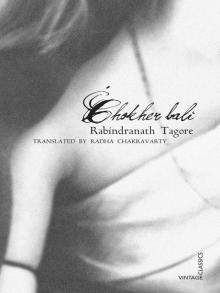 Chokher Bali
Chokher Bali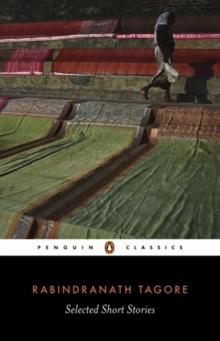 Selected Short Stories
Selected Short Stories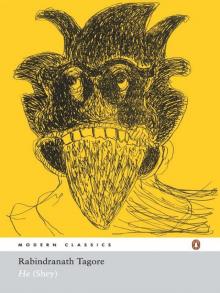 He (Shey)
He (Shey)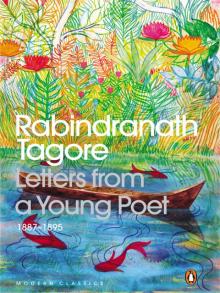 Letters From a Young Poet 1887 1895
Letters From a Young Poet 1887 1895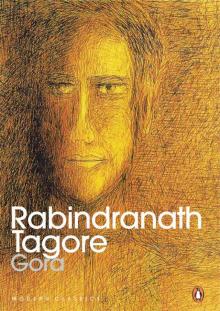 Gora
Gora Tagore Omnibus, Volume 1
Tagore Omnibus, Volume 1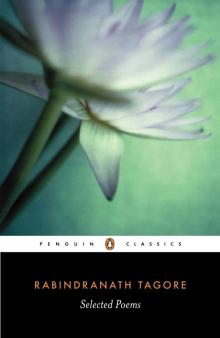 Selected Poems (Tagore, Rabindranath)
Selected Poems (Tagore, Rabindranath)